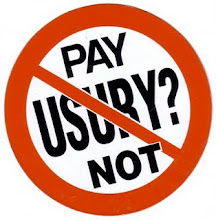The Injustice of Usury

"Since the union between David Cameron and Nick Clegg was formed last year, we have had a series of austerity measures forced upon us, including reforms to the funding of Higher Education in the UK in an attempt to tackle our huge national debt. Despite the angry protests of student bodies, MPs voted in favour of such reforms. With much of the dust now settled from the initial uproar, Aaron Porter has promised a further wave of demonstrations.[1] My previous articles have called for students to be holistic in their approach to protesting. They should avoid focussing solely on the issue of student debt and instead initiate a debate on our current debt-based economic system, which has not only caused great distress to students and the wider British public, but has also been the source of immense suffering throughout the less-economically developed World.
The Evolution of Interest
By examining the historical perspectives of usury, it becomes apparent that usury was traditionally viewed as an evil act. Plato regarded it as a way in which the rich could exploit the poor, whilst Aristotle taught that money should only ‘be used in exchange and not increased through interest’.
The practice of usury has also been condemned by all three of the Abrahamic faiths. During the Council of Nicea in 325 AD the Church was pressurised into compromising on many key principles, however the one issue they remained united on was the sinful nature of usury.[2] As history progressed, a continual struggle ensued between the merchants who wanted to profit from usury and the Church. Key developments in the ‘legalisation’ of usury include the development of the contractum trinius, which consisted of three contracts, each of which when taken alone bypass the usury provisions, but when taken together give the net result of a usurious transaction.[3] Later on, Hispanus created the idea of a lender charging the borrower a fee for any late repayments on a usury-free loan as a means of compensation to the lender. This charge later became known as ‘inter esse’[4] (from the Latin for ‘that which is in between’), and it is from this term that we derive the term ‘interest’. As ‘inter esse’ gained popularity, it was later argued that it should be charged from the outset of a loan, and not just when a late repayment was made. By the 15th Century, King Henry VIII had set a cap on interest at a rate of 10%; anything greater than this was deemed to be usury. The Church remained silent on the practice, and by the early 20th century, interest was finally accepted by the Church.[5]
The prohibitions of usury can also be found in the faiths of Judaism and Islam.
‘If you advance money to any poor man amongst my people, you are not to act like a money lender; you must not exact usury from him.’[6]
‘O you who believe, fear God and give up what remains of your claims of usury if you are truly believers. If you do not, then take notice of war from God and His apostle.’[7]
It is apparent that practicing usury has been despised throughout the ages and great efforts have been made to legalise a process which many believed to be wicked. Philosophers and religious leaders alike saw the harms of charging interest and were outspoken in their condemnation of such a practice. Despite this, we seem to have reached a situation where charging interest is deemed to be perfectly acceptable. Perhaps this is due to a combination of our unawareness of the severity of evil with which it was once perceived, along with the lack of knowledge on the alternatives." (snip) ...
Read the complete article at this website:
http://www.islam21c.com/finance/2659-the-injustice-of-usury


0 Comments:
Post a Comment
<< Home